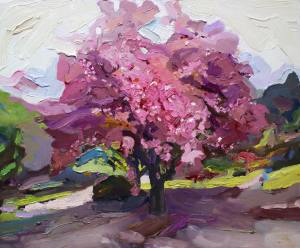 Cherry Blossom Tree in Shinjuku Garden by Richard Claremont
Cherry Blossom Tree in Shinjuku Garden by Richard ClaremontCreatives do exceptionally well what others find difficult, and that is the definition of a talent. Talent is the distinguishing quality of creatives, usually talent in one field. Although a creative can be very talented in more than one area, as many bloggers are, as Vincent van Gogh, a wonderfully expressive writer of letters as well as painter was, the creative’s talent in one area dominates. My seven year old grandson is a much better painter than I am because he is gifted in art, and I certainly am not. (It doesn’t take long for the buds of talent to burst into bloom in a child). My talents are linguistic, and of all the arts I, who grew up in home where music filled the house, I’ve always wished I could write beautiful music–but I can’t.
I have a composer friend whose music is performed by major orchestras. He’s received many prestigious awards. But he can’t paint as well as my grandson. I can’t touch my friend in any aspect of music. He is much too talented musically for me. But he can’t write poetry or prose as well as I can. Nature specializes creatives and points them in a direction. Whether they will choose to follow that direction in the course of their life or will not is their choice. How serious they will become about developing their talent–whether refining it to a high level or ignoring it–is up to them.
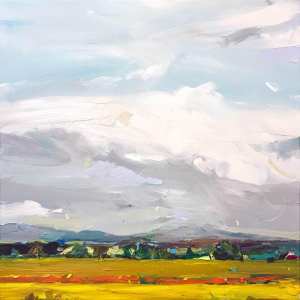 Golden Harvest by Richard Claremont
Golden Harvest by Richard ClaremontWhen you’re making use of your main talent you’re as effective as you will ever be in any area of your life because your talent is what psychologists call your “dominant faculty.” Putting it to use habitually, day after day, to be free without being interfered with in any way, is a wish, a hope, a goal, of all serious creatives.
For the creative the quality of curiosity is extraordinary because it is so intense. Also there is a fascination with how everything works, fits together, and is useful that starts of its own accord in childhood and stays with creatives to the last day of their life. Being curious and having an aptitude for picking up knowledge here and there is important. People who have stored up a wide range of knowledge have a very good chance of being creative. Once they are serious creatives and are deeply involved in their field, they have a hunger for extensive knowledge of it: “The most eminent creators are consistently those who have immersed themselves utterly in their chosen field, have devoted their lives to it, (and) amassed tremendous knowledge of it” (Geoff Colvin).
Then there is a desire, impossible to satisfy in a single lifetime, to create original things–poems, symphonies, paintings, performances–that are added to the culture, and in doing so to leave behind at career’s end a legacy, the traces of a vital human being who walked this earth, breathed, achieved, and had a personality, a name, and a reputation which will outlive the talented person by a year, or ten, or a hundred.
 Rockpool and Headland by Richard Claremont
Rockpool and Headland by Richard ClaremontAt a certain eventful time in creatives’ careers when they are no longer a novice and have matured as a craftsman, the need to paint or write, compose, act, or dance takes over, becomes powerful, and can’t be ignored. This is a turning point in the career of the creative, a new level of involvement with their craft. The creative may well feel as novelist Henry James did, that “It is art that makes life, makes intensity, makes importance…and I know of no substitute whatever for the force and beauty of its process.” The creative becomes willing to give up other rewards for the sole experience of practicing an art because it is both fulfilling and challenging in a way little else is.
To practice the art may be more than adequate compensation for disappointments in other areas of life. Disappointed in love or work, if novelists they may choose to stop thinking of their hurt and turn their active minds to the task of writing a story with many characters and an intricate plot. Rather than grieving a loss, a ballerina turns to the only art she’s known since childhood and begins to warm up.
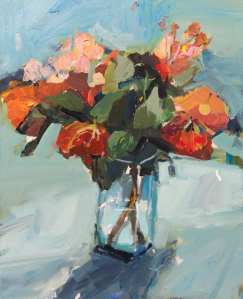 Gum Blossoms by Richard Claremont
Gum Blossoms by Richard ClaremontThere is now something in the movements of the body and mind of creatives as they work, of muscle and thought, of experimenting with ideas, and entering the pleasant elevated mood of losing oneself in the work–some force implicit in the creative act–an urge that is more intuitive than rational, subliminal and subconscious. Those aspects of the processes of creation add up to an experience which may be so blissful that it can be as addictive as abuses of alcohol, drugs, gambling, and sex. But creativity is a positive addiction, not a harmful one.
As a mature creative, your thoughts are continually on how to get better. In an interview Pablo Casals, aged ninety, was asked why he, the best cellist in the world who had been practicing the cello for eighty five years, still practiced every day, and he said, “Because I think am making progress.”
You’re already excellent at your craft–you are far above average–but are not satisfied and talk about getting better. You study, you read, you learn, you discuss. You seek feedback and help because no one in the arts or sciences–no one in life–succeeds in a noteworthy way without someone advising and helping them–a teacher, a mentor, a friend, etc. You work exceptionally hard because if you are an artist you can’t help yourself and there is no other way to work, not always knowing why you do, but feeling strongly you must.
 The Road Home by Richard Claremont
The Road Home by Richard ClaremontYou know, and experience of the creatives who have preceded you bears out, that the more hours you work, the better you get. And your skills improve–you can see that–and your work does get recognizably better–either slowly, or moderately fast, or by leaps that may astound you. Your satisfactions, ambitions, optimism, and hopes rise as your work improves.
Creative people are models of focused human effort. Few people seem to recognize that. In my many speeches to businessmen and women I had an unusual point of view. I referred to my life-long love–artists–as the best examples of highly motivated people. I’d say, “Strive to have the soul of an artist. Learn what it’s like to create something and the value of persistence from artists. Study artists. Read biographies of artists. Let their habits filter into your behavior.”
The commitment to write (or sculpt, perform on stage, etc.) can be extreme and may surpass other of your commitments. Nobel laureate writer Saul Bellow said writing had always been more important to him than his wife and children. There are other creatives such as painter Paul Gauguin and short story master Sherwood Anderson who felt the same and abandoned their wives and children for art.
The overriding aim of creatives is very practical. It is production: to produce polished works that must be completely finished because “It is only as the work is done that the meaning of the creative act” can be understood (Brewster Ghiselin). “The only certainty about writing and trying to be a writer is that it has to be done, not dreamed of or planned and never written, or talked about … but simply written” (Janet Frame). Psychologist Howard Gardner writes about high-excelling creative people. He says, “Individuals whose stock in trade is to do things which are novel, are people who’ve got to have a pretty good command of how they work.”
 Midnight at Montmartre by Richard Claremont
Midnight at Montmartre by Richard ClaremontThe creative sets out to answer the production question, “How can I produce the quality and quantity of work I want?” A perfect work place and good production routines and rituals are to be treasured. Simply by being at your work place ready to work repetitively the same time day after day, the power of good habits goes into effect.
If creatives are unable to work or the work doesn’t go well, they suffer. A creative must always have goals and begin every day’s work with those goals in mind: “Today I will buckle down and…” Many tremendously talented creatives aren’t nearly as successful as they have the talent to be. They are frustrated because they haven’t figured out for themselves the best work/production program that will achieve a desired level of high-quality output.
If you are a creative, if you could you would create night and day because for you there is never enough time and your talent finds resting very hard. Long before you finish one work, you’re contemplating the next. When artists work, they are seeking freedom of expression through perfect technique. Many of them are willing to sacrifice material rewards just to be able to exercise their talents and do their work without being interfered with or restrained–to make creative things free of conflicts. Many creatives choose lower paying jobs that will allow them time to do their creative work over higher paying jobs that don’t allow them to.
You may be working on 3, 5, or more projects simultaneously, moving from one to another as the mood strikes, putting one aside and picking up another. A creative’s lively, but unsettled production-oriented mind is a cornucopia spilling over with concepts, words, techniques, methods, facts, recollections, hopes, fears, needs, problems, solutions, texts, authors, disappointments, successes, plans, possibilities, family, projects, and if a professional, finances. It rests only at bedtime. And often, not even then.
 Still Life at 4pm by Richard Claremont
Still Life at 4pm by Richard ClaremontThe logical end of the Creatives’ Way is to have the identity of a capital C Creative, a Real Creative–to become known by your family, friends, teachers, editors, agents, other creatives and lovers of the arts, and to define yourself as “someone who is very serious about producing creative work, and is very good at it.”
The trappings of your chosen discipline appeal to you. Great writers “loved the range of materials they used. The works’ possibilities excited them; the field’s complexities fired their imaginations. The caring suggested the tasks; the tasks suggested the schedules. They learned their fields and they loved them….They produced complex bodies of work that endured” (Annie Dillard, The Writing Life).
When you’re away from your art you miss it. If you’re away too long you become edgy. Away from it longer, you become irritable and hard to live with. If you don’t do your art for 48 hours, your skills begin to decline. The only relief is to get back to your work as quickly as possible. You try to work at least one hour every twenty-four. If you work for four hours you are more satisfied with yourself than if you work for two hours.
Creatives are subject to the heights and depths of moods. The act of working makes you happy, makes you confident, and empowers you. However badly you might feel when you begin a day’s work, you feel better when you are working and when you finish you almost always feel good–but you need to work at least a little. Gertrude Stein said that even though she had never been able to write more than a half hour a day, all day and every day she had been waiting for that half hour.
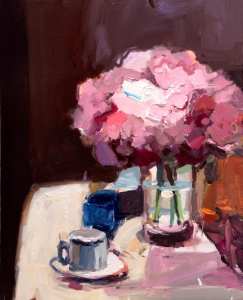 Still Life With Pink Hydrangeas by Richard Claremont
Still Life With Pink Hydrangeas by Richard ClaremontWhen you’re producing your art, you’re searching for something: authenticity. You’re trying to cut through the fakery, the tricks, the games, the insincerity, the deceit and phoniness, and the lack of conviction so that you might tell the whole truth as you see it–accurately–withholding nothing. You are modest and try to do nothing merely to make a splash because you believe that it’s only through producing work that is sincere and deeply felt that the truths you’ve discovered and now believe in and feel strongly about will be expressed.
For many serious artists, the art’s process itself is more rewarding than the product that ends the process. In this world there are many competent writers who have almost no interest in having their work published. That doesn’t excite them, but the process does. There are pianists who prefer practice to performing in public.
Patience is a necessity for creatives. Eventually after a long period of impatience you learn patience. “It’s so hard for people to be patient. It took me a very long time to get better, and a very, very long time to begin to publish. I wasn’t very patient. It’s painful….Young people are pushed so hard right out of school to get the first novel done. It takes time to write well. You have to sit with it. You have to be patient with it. You have to trust your intuition and your own material and stay with it as long as it takes” (Andrea Barrett). It’s been said that genius is nothing but an aptitude for patience.
 Sand Dunes by Richard Claremont
Sand Dunes by Richard ClaremontCreatives must have a stomach for loneliness and must be able to adjust to it when it strikes. They have no choice. Pleasure increases the more you work on your art, partially because you work alone, independent, isolated, on your own, self-sufficient, and that is how most creatives enjoy working. Since creative achievers typically engaged in solitary activities as children, they are no stranger to working alone. “Aloneness…is not merely the effect of the circumstances in the life of creators: it is often also part of their personality–for the creator is frequently apart and withdrawn even in the presence of others, and makes a deliberate attempt to seek solitude” (R. Ochse). Creatives solve many problems every day. Creatives are problem-solvers. Research on problem-solving shows that people are likely to come up with better solutions when they work alone. Poet Lord Byron said, “Society is harmful to any achievement of the heart.”
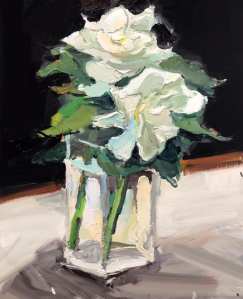 The Last Gardenias
The Last GardeniasAt times you live in uncertainties, doubts, tension, anxiety, and fear. But over the years you develop the strength to resist them. You acquire confidence and faith in your abilities and judgment. You fear fewer things. You grow less anxious and have a much fuller and more accurate understanding of yourself. The hardships, worries, disappointments, and stresses you encounter play a necessary part in making you stronger. Your strong faith in yourself helps you persist through obstacles, psychological blocks, and setbacks. Poet Stephen Spender said, “It is evident that faith in their work, mystical in intensity, sustains poets.”
Through your art you’re drawing out of yourself the end result of the entirety of your being–100 percent of yourself from your toes to the top of your head. That includes all the knowledge you’ve acquired, all the experiences you’ve lived through, good and bad, happy or painful, what your emotions are and the breadth and depths of feeling they are capable of because art depends so heavily on feelings, how courageous you are, what skills you bring, and what you aspire to become. Then, self-aware, you have a clearer understanding of who you truly are, and how high the talent you possess that is growing stronger and more apparent might take you, and what new pleasures your talent may open for you.
The beautiful paintings featured on this post are by Australian artist Richard Claremont. He says, “A successful artist knows that we do art because we have to. We would do it even if no one ever got to see it. What really matters is our commitment to our own vision, painting from our heart, creating work that matters.”
© 2019 David J. Rogers
For my interview from the international teleconference with Ben Dean about Fighting to Win, click on the following link:
Order Fighting to Win: Samurai Techniques for Your Work and Life eBook by David J. Rogers
 Click on book image to order from Amazon.com
Click on book image to order from Amazon.comor
Order Waging Business Warfare: Lessons From the Military Masters in Achieving Competitive Superiority
 Click on book image to order from Amazon.com
Click on book image to order from Amazon.comor

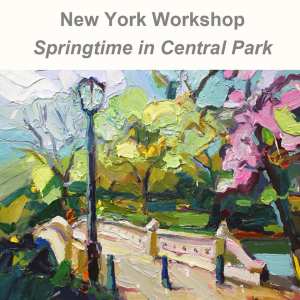
Nice post David!
I have a friend that is a great artist. He’s a painter, a sculptor, he writes good and he’s learning about photography.
Beside he’s good on those differents fields, he’s
doing great on that!
I ask myself, what’s the next field he will be developing.
David, every time I read your post I learn something new I reflect on.
Thanks for sharing your thoughts.
It was so nice to see you with your wife.
You look great.
Have a nice day.
LikeLike
It was nice seeing you too, Marilucas, and you look great too. I’m so glad you like the posts and feel you learn from them. That makes me feel very good. Your friend sounds like a very interesting person with many talents. He must be fun to know. Some people are good at many things, but most of us have one thing that we are best at.
Best wishes to you, as always,
David
LikeLike
Good morning David,
What a fine post and wonderful that you have featured the work of Richard Claremont who I follow on Twitter. Richard exemplifies so much of what you talk about here.
‘Then there is a desire, impossible to satisfy in a single lifetime…..’ Oh how true this is. I sometimes feel as an artist that I am working against the clock, particularly now that the years seem to be moving by so quickly.
As you know I am writing a book, which has already turned into two books….one the chronological map, as it were of my life thus far….and the other a novel based on my life experiences. Having virtually completed the chronological version, I am so very excited about the novel writing, because this taps into so much of what you write about here.
Fulfilling on many levels, it is using all the skills I have acquired as a painter over the past 45 years. As you say in another paragraph….it has presented me with an ‘urge that is more intuitive than rational, subliminal and subconscious’ I have to do this, and in the having to do it, I am finding a place like that I have not known before. For one I am taking your advice and being completely honest and expressing feelings and emotions in ways that I wouldn’t normally do – other than through my painting.
You are 100% correct in saying that artists are highly motivated people. There are many times when to the untrained eye it might appear that we are not working, but rest assured the artist never stops working. When unable to physically paint, write, compose, dance, etc. the work continues in the mind….and yes, even when sleeping, it never stops. This is why for me, I try never to be without note/sketch/book and pen….
I believe artist give up what most people feel it is right and correct to achieve. Until an artist does have the identity of a capital ‘C’ Creative – this is particularly difficult….because many people want to keep them on the straight and narrow, as it were……in other words achieving all those things that are considered the norm. Until I was forty when I experienced a huge turning point, I was straddling the preverbal fence…..practising my art….but not letting go of all the ‘stuff’ that made me look good in the eyes of society. Once I took that leap of faith….and that’s what it is…..I have never looked back.
Patience is something I pray for every day:) – and I must admit have become so much better at being patient…..but it’s not easy.
Thank you again dear David for your insights and words of wisdom.
I am so very grateful that we connected through this medium of blogging.
I wish for you a day filled with creative bliss.
Janet
ps. your post has given me the idea for my next blog……
LikeLike
Dear Janet,
This is a special comment from you. I sense so much of YOU in it. If I could I would have artists, writers, actors, dancers everywhere know that the kind of authenticity and forthrightness that is so obviously a part of your personality has led you to happy creative days and will lead them to good works. You are such an intense human being full of wisdom and drive that apparently knows no bounds. They pour out of you like wine from a cask. You are young in spirit, and just so talented.
I’m happy for you that at that key juncture in your life you chose the path less traveled, and happy for myself that you share your ideas and ideals with me. I know that your turning point was an upheaval in your life, and not easy. I have no doubts that your books will be as beautiful as your hummingbirds and I am excited about them. They will have many stories and many ideas for creatives that will benefit their confidence and their craft because that’s your genius. I agree with you that the artist knows no rest, but has an insatiable, impossible to understand, need, to be in action, to create, to exhaust herself if need be.
I’m so pleased that you are able to apply your skills as a painter to the act of creative writing, since your skills are highly developed, and your writing can only benefit from them. I’m so pleased too, that you find writing so fulfilling. How wonderful to have two creative media. You are happy, and I’m sure that will add to the beauty of your writing.
I think what is important to you is a creative’s right to self-determination unencumbered by silly values that too often inhibit people. I am similar and was bred on Thoreau’s “Keep pace with the drummer you hear. However measured or far away.”
I thank you so much for your constant support, and for this comment and all the others you’ve sent to me, as well as your rebloggings of my work. I needn’t say more about my feelings for you other than to say that I miss you though we’ve never met.
Fondest wishes,
David
LikeLiked by 1 person
Thank you David 🙂
LikeLiked by 1 person
Enjoyed you narrative on Creatives, David, and found the paintings by Richard Claremont truly stunning.
LikeLike
Thank you very much, Jet. Glad you enjoyed it. I agree that Richard is quite a painter.
LikeLiked by 1 person
Richard’s work is so beautiful, love tweeting it regularly! 🙂
Loved, “there is a desire, impossible to satisfy in a single lifetime, to create original things–poems, symphonies, paintings, performances–that are added to the culture, and in doing so to leave behind at career’s end a legacy, the traces of a vital human being who walked this earth…” – yes! 🙂
LikeLike
Felipe, I’m so happy you like what I have to say and Richard’s beautiful paintings. I also love tweeting your beautiful work.
LikeLiked by 1 person